|
|
|
Sort Order |
|
|
|
Items / Page
|
|
|
|
|
|
|
| Srl | Item |
| 1 |
ID:
033136
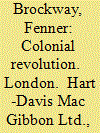

|
|
|
|
|
| Publication |
London, Hart-Davis Mac Gibbon Ltd., 1973.
|
| Description |
654p.Hbk
|
| Standard Number |
0246106050
|
|
|
|
|
|
|
|
|
|
|
|
Copies: C:1/I:0,R:0,Q:0
Circulation
| Accession# | Call# | Current Location | Status | Policy | Location |
| 012857 | 909.8/BRO 012857 | Main | On Shelf | General | |
|
|
|
|
| 2 |
ID:
141592
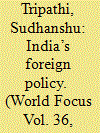

|
|
|
|
|
| Summary/Abstract |
India’s Foreign Policy, under its first Prime Minister Nehru, had been well-known for its strict adherence to non-alignment vis-à-vis international conflict while focusing on anti-colonialism, anti-imperialism, anti-racialism and apartheid besides world peace through panchsheel. This pacifist diplomacy was neither to result into blind submission or compliance of super or major powers nor should it prevent the development of strategic alliances that strengthen the country’s position in the international system. In fact, it was particularly aimed at achieving self-sufficiency for ensuring the country’s economic development as a precondition of political and social progress, stability and harmony. Perhaps Nehru had no faith in free trade, globalization and economic liberalization and foreign investment as instruments of socio-economic progress. Later Prime Ministers Lal Bahadur Shastri, Indira Gandhi and Rajiv Gandhi abandoned the idealistic vision of Pt. Nehru and pursued a more realistic foreign policy for securing the country’s national interests in the World. After the demise of Cold War, the foreign policy under PM NarasimhaRao and Dr.Manmohan Singh took several new steps like supporting globalization and economic liberalization, close cooperation or strategic partnership with the United States, forging ties with Israel and many more. India has now drawn lessons through various unprecedented incidents at the international level that the road to socio-economic development passes only through globalization and liberalization and global interconnectedness and interdependency. This was stated by PM Manmohan Singh: “Our government has
|
|
|
|
|
|
|
|
|
|
|
|
|
|
|
|
| 3 |
ID:
122647
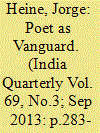

|
|
|
|
|
| Publication |
2013.
|
| Summary/Abstract |
Pablo Neruda has been described by some as the most widely read poet ever. His output was prodigious and diverse. He was also very much a man and a poet of his time, that of the first three-fourths of the 'short' twentieth century, a time very different from our own. That raises the question: Is it possible to split the poet from his politics? A standard recommendation of literary critics is to stick to Neruda's 'non-political' work and forget the rest. Yet, Neruda himself insisted that not only his poetry but also his personal life and his politics formed an indivisible whole. At a time when the rise of Asia and South America is changing the global landscape, it is especially important to come to terms with the central perspective that inspired Neruda's oeuvre: his identification with the common man and with the South; his anti-colonial spirit (honed during his Asian sojourn) and his extraordinary grasp of what José Martí referred as 'nuestra América'. This article explores how Neruda provides us with a vocabulary and a grammar that allows us to look at the emerging new world of the twenty-first century with fresh eyes.
|
|
|
|
|
|
|
|
|
|
|
|
|
|
|
|
| 4 |
ID:
110863
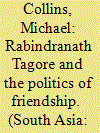

|
|
|
|
|
| Publication |
2012.
|
| Summary/Abstract |
Caught between an arrogant European modernist elite and a proprietorial Indian nationalism, Tagore challenged the spatial dimensions of modernity by critiquing both Eurocentrism and a simplistic anti-imperialism. Tagore did build bridges with some Western intellectuals and social activists but much of his life illustrates the difficulties of meaningful cross-cultural relations and the shortcomings of a liberal 'politics of friendship'. If this is in part due to the inadequacy of translation, then we need more and better translations. Rather than resurrecting a platitudinous 'cosmopolitan' World Citizen, Tagore's work should require us to think more critically about parallel modernities and different ways of imagining our futures. As China and India, perhaps above all others, grow in economic, political and cultural strength, these questions are likely to become more pressing.
|
|
|
|
|
|
|
|
|
|
|
|
|
|
|
|
| 5 |
ID:
171313
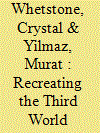

|
|
|
|
|
| Summary/Abstract |
In this paper, we make a theoretical argument that the Third World be returned to its political origins to inspire an updated Third World Project (TWP), revived as a global movement for progressive, anti-imperialist forces, through the Fourth World movement, which highlights internal colonialism. Both the TWP and the United Nations recognise only nation states as full members. We examine how a Third World strategy that brings in the Fourth World, or indigenous, minority and/or stateless groups, can help oppressed groups gain more autonomy and rights through a transnational solidarity rooted in empathy. We trace the intellectual roots and history of the TWP and consider obstacles in bringing together the TWP and the Fourth World movement. A Fourth World strategy corrects the TWP’s implicit approval of an underlying imperialism, and the TWP provides the Fourth World movement a model to accomplish its goal of resisting uncritical modernity.
|
|
|
|
|
|
|
|
|
|
|
|
|
|
|
|
|
|
|
|
|